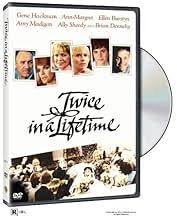
TWICE IN A LIFETIME
US, 1985, 111 minutes, Colour.
Gene Hackman, Ann Margret, Ellen Burstyn, Amy Madigan, Ally Sheedy, Stephen Lang, Brian Dennehy.
Directed by Bud Yorkin.
The cliche is that love is once-in-a-lifetime. The screenplay here raises the question whether it can be twice.
The screenplay is written by British, Colin Welland (soon to win an Oscar for Chariots of Fire). It is a British writer observing and researching in Washington State, in Seattle. The direction is by Bud Yorkin, best known for light entertainment is including The Thief Who Came to Dinner, Start the Revolution Without Me). Which means that the screenplay is both serious and sometimes with a lighter touch.
Gene Hackman is completely persuasive as Harry, steelworker, turning 50, celebrating, attracted by Ann Margret as Audrey at the bar, unsettled in his long marriage to Kate, Ellen Burstyn. There is the attraction, the mutual response, his decision to leave home, the drama of the discussions with Kate, the challenge of his older daughter, Sunny (Amy Madigan in an Oscar nominated performance), and the more sympathetic younger Helen, Ally Sheedy, about to be married.
This is a film of the 1980s – and attitudes towards marriage, separations, divorce became much “freer” in succeeding decades. However, here is a story which can resonate with middle-aged couples throwing some light on the crises.
- Title? Expectations? Treatment of the themes and issues, quality?
- Americana, universal message? Seattle and Washington State locations? The city, the suburbs, factories, bars?
- The themes, perennial? The British screenwriter and his perspectives?
- The realities of situations, midlife crisis, years of work, fulfilment, lack of fulfilment, marriage, love, taking spouses for granted, men and women, stereotypes, idealising of situations? Anger, coping, surviving? The next generation?
- The focus on Harry, Gene Hackman performance, turning 50? Seeing him at home, seeing him at work, his range of friends? The quality of his relationships, individuals? The party, the presence? Kate and his long relationship with her, sleeping, his going out, Kate staying home? The job, Nick? The party, Audrey, the kiss, the opportunity?
- Harry and his behaviour, going out, the car park, nervous, enjoying Audrey’s company, sharing? His stories, memories with Kate? Knowing the reality, the issue of being caught? Confrontation and response? Sunny and her reaction, Audrey and anxiety, Nick and the break? His talking with Kate, angers, with each member at home? Leaving, in the city, the neighbourhood, the apartment? With Audrey, buying the watch, becoming a new man, severing ties, ringing Helen and talking with her, the wedding and his enjoyment? The photo, not going to the party, alone?
- Ellen Burstyn as Kate, long-suffering, the long marriage, at home, supportive of Harry, bringing up the children, relationship with the children? Not noticing his crisis? His leaving, the repercussions, the discussions, angers? And the reaction of the children?
- Sunny, anger, older daughter, the challenge to her father? Her own life? The contrast with Helen, about to be married, Harry’s warming towards her? The preparations for the wedding? His attendance or not?
- Audrey, and Margaret’s glamour, even in the bar? Her work, personality, noticing Harry, the attraction, his response to her, the kiss, her consenting to the affair, the meetings, in the car, the effect on Harry, the effect on her? The future?
- The characters in the background, Nick, at work, his workmates, 50th birthday, the friendship? Helen and the preparations for her wedding, the fiance, the marriage?
- Familiar material? How well written and insightful? How well portrayed? Insight into midlife crisis, its effect on men, on women?